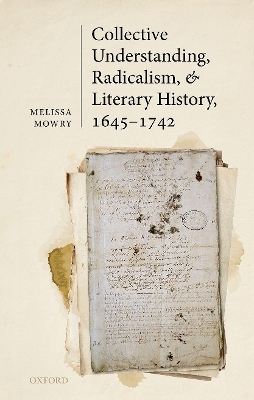
Collective Understanding, Radicalism, and Literary History, 1645-1742
Oxford University Press (Verlag)
978-0-19-284438-5 (ISBN)
Political, literary, and cultural historians of the early modern Anglophone world have long characterized the crucial century between 1642 and 1742 as the period when absolutist theories of sovereignty yielded their dominance to shared models of governance and a burgeoning doctrine of unalienable, individual rights. Yet even the most cursory glance at the cultural record, reveals that individualism was largely a footnote to a conflict over the production of political and cultural authority that erupted around the middle of the seventeenth century between sovereignty and collectivity. Collective Understanding, Radicalism, and Literary History reaches back to the English civil wars (1642-46, 1648) when a distinctive and anti-authoritarian hermeneutic emerged from the dissident community known as the Levellers. Active between 1645 and 1653, the Levellers argued that a more just political order required that knowledge, previously structured by the epistemology of singularity upon which sovereignty had built its authority, be reorganized around the interpretive principles and practices of affiliation and collectivity.
Collective Understanding contends that late Stuart and eighteenth-century literature played a central role in marginalizing the non-elite methods of interpretation and knowledge production that had emerged in the 1640s. While pamphlets and other readily available texts ridiculed members of the commonalty, it was the longer narrative arcs of drama and fiction that were uniquely able to foreground the collaborative methods civil war dissidents and the Levellers in particular had used to advance their opposition to sovereignty's epistemological paradigm. Writers such as William Davenant, Aphra Behn, Edward Sexby, Algernon Sidney, and Daniel Defoe repeatedly exposed these dissident methods as a profound and potentially catastrophic challenge to the political privileges of the ancien régime as well as its ancestral monopoly on the production of new knowledge.
Melissa Mowry teaches seventeenth- and eighteenth-century English literature at St. John's University. She is editor of Defoe's Roxana (Broadview, 2007) and author of The Bawdy Politic (Ashgate, 2004). Dr Mowry has held fellowships from the Folger Shakespeare Library and the Huntington Library. In 2013, her article "Past Remembrance or History" (ELH 79.3) was the recipient of the American Society for Eighteenth Century Studies' James L. Clifford Award.
1: Collectivity: Past and Present
2: Root and Branch--Representation, Collectivity, and Dissidence
3: "Past Remembrance or History"
4: Tyrants and Heroes: Reimagining Civil War History as an Instrument of Sovereignty
5: Counterpoint--Defoe's Roxana, Eliza Haywood and the Emergence of An Apolitical Hermeneutics of Collectivity
Coda: Out of Time
| Erscheinungsdatum | 22.12.2021 |
|---|---|
| Zusatzinfo | 3 Illustrations |
| Verlagsort | Oxford |
| Sprache | englisch |
| Maße | 147 x 224 mm |
| Gewicht | 444 g |
| Themenwelt | Geisteswissenschaften ► Sprach- / Literaturwissenschaft ► Anglistik / Amerikanistik |
| Geisteswissenschaften ► Sprach- / Literaturwissenschaft ► Literaturwissenschaft | |
| Sozialwissenschaften ► Politik / Verwaltung ► Politische Theorie | |
| ISBN-10 | 0-19-284438-5 / 0192844385 |
| ISBN-13 | 978-0-19-284438-5 / 9780192844385 |
| Zustand | Neuware |
| Haben Sie eine Frage zum Produkt? |
aus dem Bereich


